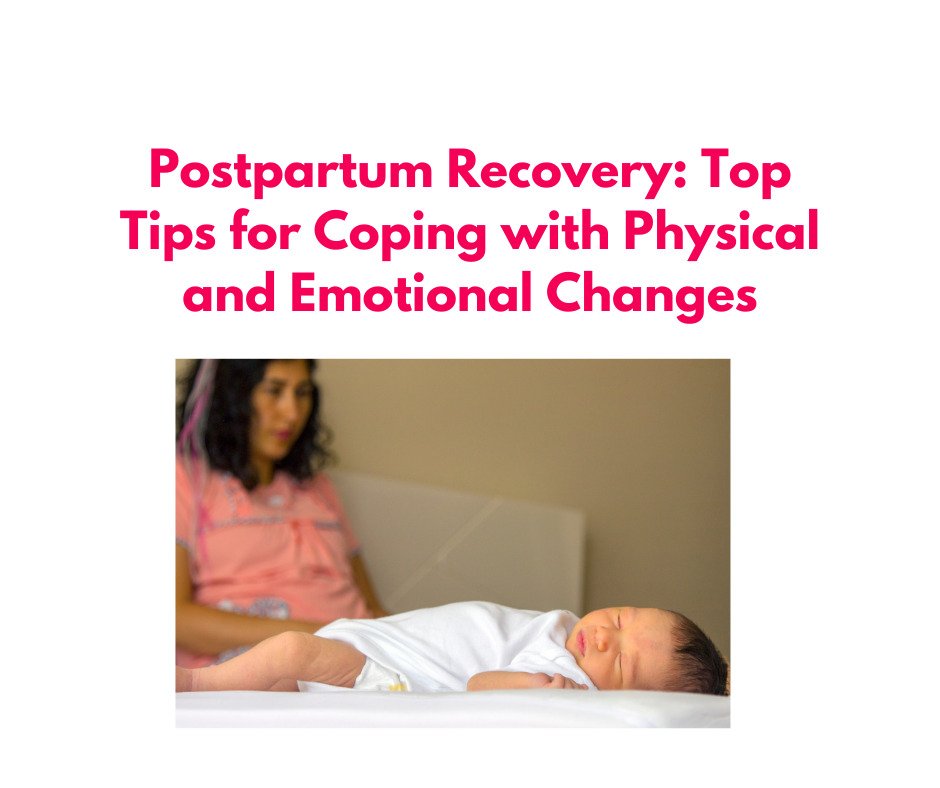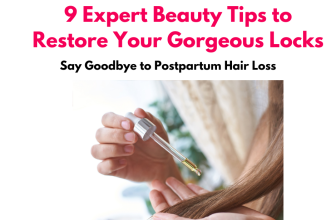
Discover top postpartum tips and techniques for coping with postpartum recovery, including physical and emotional changes. From self-care practices to professional support, our expert advice can help new moms navigate this challenging time.
Congratulations on your new bundle of joy! While the arrival of a new baby is an exciting time, it can also be overwhelming and exhausting, both physically and emotionally.
Postpartum recovery can be a challenging time for new moms as they adjust to their changing bodies and navigate the demands of motherhood. From physical discomfort to mood swings, there are many different experiences that come with postpartum recovery. However, with the right tools and techniques, you can cope with these changes and ease your transition into motherhood.
In this article, we’ll explore some of the best ways to manage postpartum recovery and help you feel your best as you embark on this new chapter in your life.
Best postpartum recovery tips for coping up after delivery
As a mom who has experienced the challenges of postpartum recovery firsthand, I know just how overwhelming it can be. To help you navigate this time, I’ve compiled some top tips and techniques for coping with both the physical and emotional changes that come with postpartum recovery.
Take care of your mental health
Postpartum depression and anxiety are common after childbirth. If you’re struggling with your mental health, it’s essential to seek help from a professional. Talk to your doctor, a therapist, or a support group to get the support you need.
Also Read – Why Mental Health Matters for Moms: Strategies for Coping with Anxiety and Depression
Use postpartum products
There are many products available that can help you cope with the physical changes of postpartum recovery. For example, you may want to use a perineal spray or balm to soothe soreness after childbirth, or a nursing pillow to help you breastfeed more comfortably.
This spray contains organic herbs like witch hazel and lavender to soothe soreness and promote healing after childbirth.
These cooling pad liners can provide relief and comfort after delivery, especially if you experience perineal tears or swelling.
This nursing pillow provides support and comfort for both you and your baby during breastfeeding.
Breastfeeding moms may need to pump breast milk, and this pump can make the process easier and more efficient. It has a portable and discreet design, and comes with a tote bag for easy transport.
This kit includes a variety of postpartum products like disposable underwear, perineal cooling pads, and healing foam to help you cope with the physical changes of postpartum recovery.
Bathing a newborn can be challenging, and this tub can make it easier and safer. It has a built-in sling for newborns and a contoured design for toddlers.
Eat a healthy diet
Eating a balanced diet can help you recover faster after childbirth. Focus on eating whole foods like fruits, vegetables, whole grains, and lean protein. You may also want to take a postnatal multivitamin to ensure that you’re getting all the nutrients you need.
This postnatal multivitamin provides essential nutrients like iron, calcium, and folic acid to support your recovery and your baby’s development.
Stay hydrated
Drinking plenty of water is essential for postpartum recovery, as it helps to flush out toxins and reduce inflammation. Aim to drink at least 8-10 glasses of water per day, and consider adding electrolyte drinks or coconut water to your diet for extra hydration.
Take care of your physical health
It’s important to take care of your physical health during the postpartum period to aid your recovery. You may experience a range of physical symptoms, including vaginal bleeding, soreness, and swelling.
You can ease these symptoms by using postpartum care products like perineal ice packs, sitz baths, and perineal spray. These products can provide cooling relief and reduce inflammation, making you feel more comfortable.
Breastfeeding can be painful and uncomfortable, especially during the early postpartum period. These therapy packs can help soothe sore nipples and relieve breast engorgement.
Prioritize rest and sleep
Rest and sleep are essential for your physical and emotional wellbeing during the postpartum period. However, it can be challenging to get enough rest with a new baby to care for. One way to prioritize rest is to accept help from family and friends.
Consider asking someone to watch the baby while you nap, or take turns caring for the baby with your partner so you can both get some sleep. Another tip is to sleep when the baby sleeps, even if it’s just for a short nap.
Also Read – Top Strategies for Managing Sleep Deprivation as a New Mom: Expert Tips and Advice
Practice self-care
Taking care of yourself is important during the postpartum period, both physically and emotionally. Self-care can include things like taking a relaxing bath, getting a massage, or spending time doing something you enjoy. You can also practice self-care by eating well and staying hydrated, which can help with your recovery and energy levels.
Also Read – 15 Essential Self-Care Ideas for New Moms: Tips and Products to Help You Thrive
Seek support
The postpartum period can be an emotional rollercoaster, and it’s normal to feel overwhelmed or anxious at times. Seeking support can help you feel more grounded and less isolated. You can reach out to friends or family members who have been through the postpartum period, or join a support group for new moms.
You may also want to consider talking to a mental health professional if you are experiencing more severe symptoms like depression or anxiety.
Ease back into exercise
Exercise can be an important part of postpartum recovery, but it’s important to ease back into it gradually. Your body needs time to heal after childbirth, and jumping back into intense exercise too soon can be harmful. Consider starting with gentle exercises like walking, yoga, or stretching.
You can also use postpartum exercise products like a postpartum belly wrap or pelvic floor trainer to help support your body during exercise.
This wrap can help support your abdominal muscles and provide back support during postpartum recovery. It comes in different sizes and styles to fit your needs.
Pelvic floor exercises are important for postpartum recovery, and these kegel weights can help you strengthen your pelvic muscles. The set comes with different weight options and a user manual.
Take it one day at a time
The postpartum period can be overwhelming, and it’s important to take things one day at a time. Try not to put too much pressure on yourself to do everything perfectly or have everything figured out. Remember that recovery takes time, and it’s okay to ask for help when you need it.
How long does it take to fully recover from childbirth?
Every woman’s recovery time after childbirth is different, but it generally takes six weeks to fully recover from a vaginal delivery and up to eight weeks for a cesarean delivery. However, it’s important to note that every woman’s body and recovery time is unique, and it’s essential to listen to your body and follow your doctor’s advice.
When can I start exercising after childbirth?
It’s crucial to wait for your doctor’s approval before starting any exercise regimen after childbirth. Usually, it is recommended to wait six weeks after a vaginal delivery and eight weeks after a cesarean delivery. Start slowly and listen to your body. You can use postpartum exercise products like a postpartum belly wrap or pelvic floor trainer to help support your body during exercise.
How can I manage postpartum depression?
Postpartum depression is a common condition that affects many new mothers. It is essential to seek help and support from your partner, family, and friends. It’s also essential to take care of yourself by getting enough sleep, eating healthy foods, and finding time for self-care activities. Speak with your doctor or a mental health professional for further advice.
How can I deal with postpartum pain?
Postpartum pain is common after childbirth, and it’s essential to take care of your body during this time. Using ice packs, heat therapy, or over-the-counter pain medications like acetaminophen or ibuprofen can help alleviate postpartum pain. It’s also essential to take time to rest and let your body heal.
What can I do about postpartum hair loss?
Postpartum hair loss is a common condition that affects many new mothers. It’s essential to take care of your hair by using gentle hair care products, avoiding tight hairstyles, and avoiding harsh chemical treatments. Eating a healthy diet that’s rich in protein, iron, and other essential nutrients can also help promote hair growth.
How can I manage postpartum incontinence?
Postpartum incontinence is common after childbirth, and it’s essential to take care of your body during this time. Using pelvic floor trainers or doing Kegel exercises can help strengthen your pelvic floor muscles and improve bladder control. It’s also essential to drink plenty of water and avoid caffeine and alcohol, which can irritate the bladder.
Remember, postpartum recovery is a journey, and it’s essential to take care of yourself during this time. Don’t hesitate to seek help and support from your partner, family, friends, or medical professionals if you need it.
In conclusion, postpartum recovery can be a challenging time for new moms, but with the right techniques and support, you can navigate this period with ease. Remember to be patient with yourself, listen to your body, and seek help when you need it. By following the tips and techniques outlined in this article, you can make your postpartum recovery as smooth and comfortable as possible.
Whether it’s taking time to rest and heal, practicing self-care, seeking help from professionals, or using products to support your recovery, there are many ways to cope with the physical and emotional changes that come with postpartum recovery. So, embrace this new chapter in your life and trust that you have the strength and resilience to overcome any challenges that come your way. With time and patience, you will be able to fully recover and enjoy the joys of motherhood.







